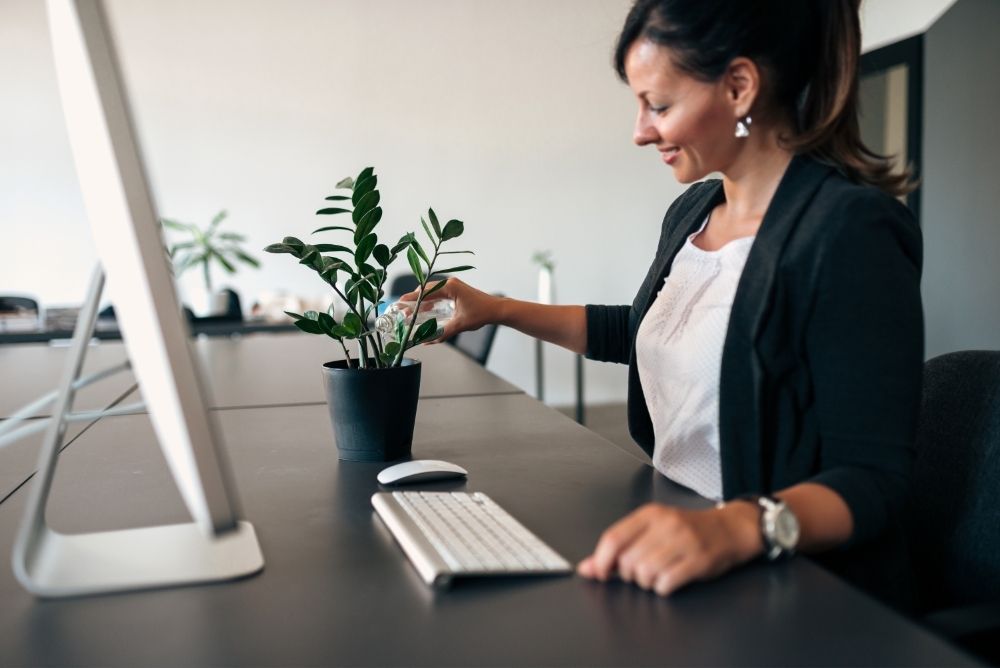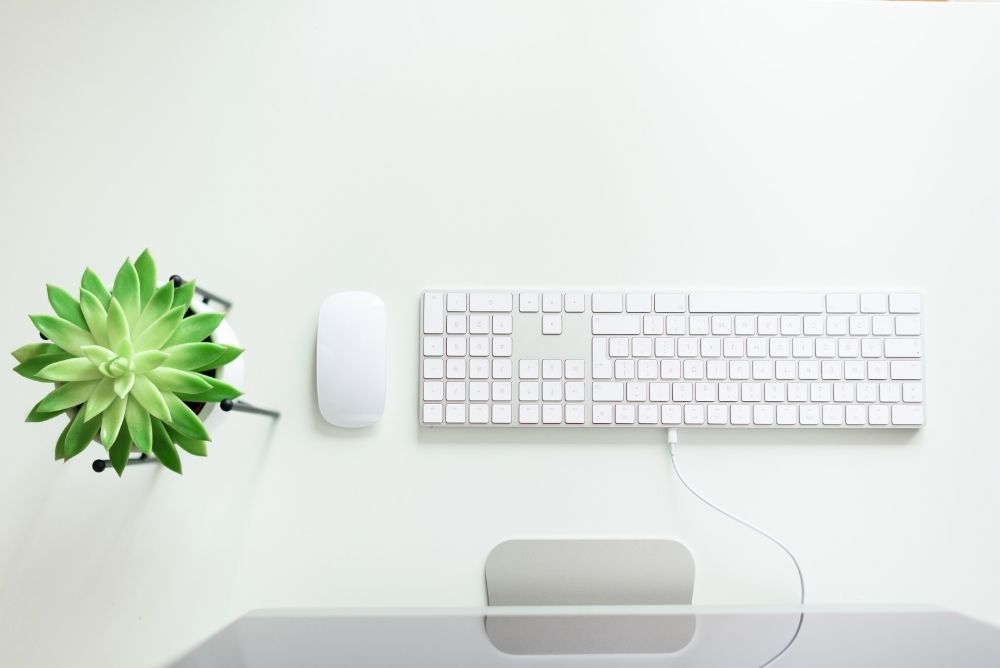- Desk Plant: How to Spruce Up Your Workspace
- Zephyr Jaeger
- April 8, 2021
- 12:06 am
- No Comments
If work keeps you tied to your desk, whether at home or in an office, it’s important to keep things from feeling drab. Thankfully, adding desk plants to your space can dramatically brighten things up! In this article, learn about the best plants to keep on your desk and all the benefits they can bring you!
What Are the Benefits of Having a Desk Plant?
Some people are obsessed with plants, and others don’t think twice about them, but everyone can benefit from having them nearby. There are numerous benefits of adding plant decor to office spaces, including stress reduction, increased productivity, and cleaner air!
Desk Plants Can Reduce Stress
According to numerous studies, including 2010 research done by the University of Technology, Sydney (UTS), even just one desk plant can dramatically reduce office workers’ stress. According to the UTS study, office workers who had a plant placed on their desk “showed reductions in stress levels and negative feelings of a magnitude of 30 to 60%.” That’s a HUGE decrease in general stress.
Plants Help Purify the Air
An iconic 1989 NASA study identified that indoor plants could detoxify the air by removing volatile compounds such as benzene and formaldehyde. Some are more adept at this task than others (like Jade and Snake Plants), though most indoor/office plants can purify the air to some degree.
Plants Can Help Increase Attention & Productivity
Urban work environments can be very stressful places; it can feel like your attention is pulled in a million directions at once. Answer this email, fill out this report, attend this meeting, and do it all RIGHT AWAY. By keeping plants on your desk and in your general workspace, you can help yourself refocus on the important tasks and increase diminished productivity.
How do plants do this? By increasing our bottom-up attention. Our focus can be thought of in two different ways: bottom-up and top-down processing. Essentially, bottom-up processing is external things that our brain tries to figure out (we know that a tree has no leaves because we see it).
Top-down processing, on the other hand, is all about context. Those who drive to work every weekday wake up on Mondays and get in their car without having to look at a calendar or call the office to ask whether they are working that day. Using top-down processing, you can use your previous knowledge and plans to make decisions.
Top-down processing is necessary and useful — we rely on it for things such as when a car horn honks, and we suddenly know to get out of the way and be alert. However, these abilities can wear out over time, especially when countless important tasks are thrown on our plates every day.
Luckily, nature “modestly grabs attention in a bottom-up fashion.” This can pull us out of the top-down-oriented mindsets that can occasionally keep us from living in the moment. Plants allow our top-down attention to replenish, boosting focus and making us more mindful!
Plants Make Offices More Welcoming to Employees & Applicants
Gray cubicles and bare walls — save for a motivational teamwork poster from the ’90s — are just plain uninteresting. Personal photos, trinkets, calendars, and candy jars can brighten things up, but nothing gets the job done better than an actual living plant in an otherwise lifeless space.
By filling the space with office plants, the environment becomes more welcoming, natural, calming, and (literally) alive. Employees will be happier in their zones, and visiting interviewees and applicants will be drawn to the pleasant botanical vibes.

Are Desk Plants Easy to Care For?
Many plant varieties out there can thrive on office desks, even far away from windows. However, some are light-loving window plants that may have a hard time with lower lighting and no weekend care. The key is to search for plants that others have had success with in office spaces — those are a great place to start.
Is Special Lighting Needed for Desk Plants?
Plants that are labeled as indoor or office plants can often flourish in fluorescent/artificial lighting. Some — especially foliage plants — actually enjoy the blueish-white fluorescent light. Flowering plants often need more natural sunlight to thrive and might not fare well in office spaces.
Which Desk Plants Are Best for an Office?
While several plant varieties can thrive in offices, a certain few are particularly capable of surviving in low light. Let’s take a closer look below.
Pothos
Pothos are prolific, notoriously easy indoor plants. They don’t just survive in low light; they need it to thrive. This makes them perfect for offices with few windows. The broad, glossy leaves grow from long, draping tendrils that can grow for many years with the proper care.
Pothos are toxic to cats and dogs, so if you have pets at home, the office is a great place to enjoy this low-maintenance plant. Plus, they only need water about once every two weeks, meaning they won’t wilt over the weekends or if you take some time off.
Snake Plant
Another low-light lover, Snake Plants do exceptionally well in office spaces. Plus, as we mentioned, they’re particularly effective at purifying the air. Snake Plants’ sturdy, upward-growing, patterned leaves are beautiful and unique — but they are also toxic to dogs and cats (so, great for the office!).
Aglaonema (Chinese Evergreen Plant)
Aglaonemas are whispy, elegant plants that resemble evergreen saplings. Also called the Chinese Evergreen Plant, these majestic beauties prefer partial to full shade — making them great for desks away from windows. Like the last two plants, Aglaonemas are toxic to cats and dogs.
ZZ Plant
The ZZ plant, or Zamioculcas zamiifolia, is one of the most popular office plants worldwide. ZZ plants thrive in low light and are drought-tolerant, making them perfectly hardy for office spaces. They’re excellent air purifiers, and their foliage is straight out of a botanical dream.
ZZ plants are toxic to humans and animals, so the office is an excellent place to keep them away from curious pets and kids. After handling your ZZ plant, give your hands a quick scrub to reduce the risk of irritation occurring.
Are There Health Concerns That Come With a Desk Plant?
While indoor plants can help us in many ways, there’s no avoiding that some people have allergies. Before bringing a desk plant to the office, do the courteous thing and check with your coworkers. Even if it will be on your desk, it’s still a shared space, and you don’t want to make anyone uncomfortable.
Spiky plants like cacti can also pose a risk for minor injuries in the office. Be cautious of where you place them. If you lean across your desk one way to reach the trashcan, don’t place a cactus there as you’re likely to scrape your arm. The same goes for common areas like break rooms and reception.

What is the Most Common Reason Desk Plants Die?
Even though many plants do well in low light and without frequent water, problems can still arise. Sometimes, the indirect light from far away windows and fluorescent lights just isn’t enough for some plants. Underwatering because of forgetfulness or vacations can also cause them to wilt.
If you notice your desk plant struggling, see if there’s somewhere else in the office you can put it with more light. Maybe your coworker near the window will be happy for the new desk buddy! Or, you can always try bringing it home if you think you’ll have a better space for it there.
Where Can I Get a Desk Plant?
Why, Planted Pot, of course! We have Snake Plants, Aglaonemas, and many others that are great for indoors and low light. Plus, we have comprehensive care guides for each plant available on our site! You can also snag cute pots and plant stands while you’re here to get all your plant shopping done in one place.
Final Thoughts – Desk Plant
Office plants are a fantastic way to brighten up your desk and invite all of the previously discussed benefits into your work life. Cleaner air, reduced stress, increased productivity — desk plants bring it all to the table (literally). Try adding a few to your workspace and see how it can improve your daily work experience and routine!
